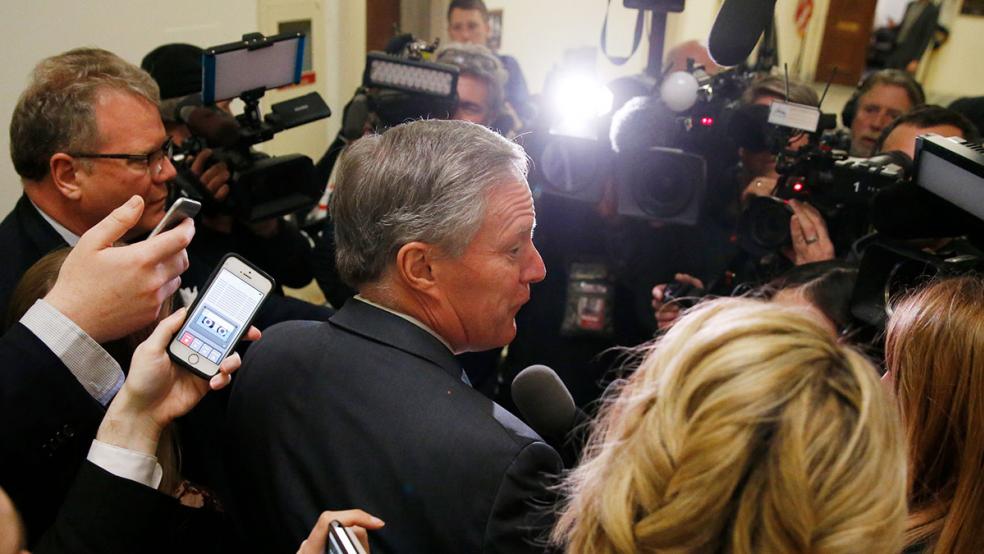In an embarrassing setback for the Trump administration and Republican leadership in the House of Representatives, a planned vote on a bill to repeal and replace the Affordable Care Act was cancelled Thursday afternoon after it became apparent that it did not have enough GOP support to pass. Both supporters of the legislation and conservative Republicans demanding changes to it said they were confident it would ultimately pass, but how that would happen remained unclear at best.
The American Health Care Act was never going to get any Democratic votes in the House, so Republicans have always known that it would require them to hold together most of their own members in order to get to 216 votes, the current level needed for a majority. However, the need for near unanimity gave the House Freedom Caucus, a loose collection of the chamber’s most conservative members, enormous leverage over the bill’s final form.
Related: Has Trump Overplayed a Losing Hand in His First Legislative Test?
The Freedom Caucus spent the past week exercising that power, pressing House leadership and the Trump White House for concessions, such as accelerating the rollback of ACA-related taxes, changes to the rules for Medicaid eligibility, and the elimination of a requirement that insurance plans cover to “essential” health care treatments, including maternity care, mental health and addiction services, and more.
By Thursday afternoon, nobody was happy. The members of the Freedom Caucus were said to be pressing for still more concessions, particularly the elimination of ACA regulations on the insurance industry. Meanwhile, House leaders were facing defections from the other end of the party’s spectrum, as less doctrinaire conservative members balked at the changes the Freedom Caucus was demanding.
On Thursday morning, there were estimated to be two dozen Republicans planning to vote against the bill. By the afternoon, despite a day of meetings, negotiations and deal-sweetening, that number had risen to around 30. GOP leaders can only afford to lose 21 votes.
The decision to postpone the vote appeared to catch the White House by surprise. Press Secretary Sean Spicer was insisting early Thursday afternoon that the vote would take place today. And President Trump, even after the postponement had been announced, appeared before cameras in advance of a meeting with representatives of the trucking industry and insisted that a vote was still taking place.
Related: The GOP’s Charge of the Obamacare-Lite Brigade
Later, a White House deputy press secretary tried to spin the delay as favorably as possible, insisting that the move was made only to avoid having to vote in the middle of the night. White House officials insisted that a vote would be held Friday morning.
However, in an interview with CNN, House Majority leader Kevin McCarthy, who actually controls when the House votes, was less sanguine. He said the Republican conference would meet tonight and that the Rules Committee would pass a rule allowing a vote to take place tomorrow. But when asked if there would be a morning vote, he committed only to starting debate on the bill.
The contents of the bill itself remain something of a mystery. On Monday, amended versions of the original bill were made available, revealing some of the changes that were made. However, there have been marathon negotiations since then, and it remained unclear as of late Thursday what the final piece of legislation would actually look like.
On Thursday afternoon, in a revised analysis of the AHCA that included the changes from earlier in the week, the non-partisan Congressional Budget Office reported that the proposed revised plan would achieve even smaller deficit reduction over the coming decade than the original plan while doing little to address projected higher premiums and reduced coverage.
According to the new CBO report, the revised House GOP plan would reduce federal deficits by $150 billion over the coming decade, or less than half the previously projected savings in the federal government. And the latest analysis continues to show a huge fall off in the number of Americans with health care coverage if Obamacare is replaced with this proposal. By 2026, an estimated 52 million people under the age of 65 would be uninsured under the House GOP approach.
Related: How Republicans Got Trapped by Their Health Care Promises
The drama on Capitol Hill comes amid growing public discontent about the AHCA.
A new poll by Quinnipiac University found that only 17 percent of American voters approve of the House Republican plan, while 56 percent are against it and 26 percent are undecided. The poll found that nearly half of the voters interviewed said they would be less likely to vote for their House member or senator if he or she votes for the plan, while 19 percent said they would be more likely to support their representative in that case.
Democrats, meanwhile, are standing back and watching as the Republicans and the White House struggle to avert total disaster. Rep. Dan Kildee (D-MI) told MSNBC Thursday that Trump and House GOP leaders are spinning their wheels in trying to craft a compromise that could survive a House vote and unite the party.
“Their problem is they have a very bad piece of legislation,” Kildee said, adding that many rank and file Republicans are hearing from constituents who are afraid they will lose their coverage.
“They are hearing loud and clear they don’t want it,” Kildee said.
Former Democratic governor of Pennsylvania Ed Rendell described the situation “as a train wreck, and it’s pretty hard to make it better.” The biggest losers could be more moderate Republicans if they are forced to go along in trying to get the bill through the House.





